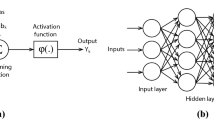Abstract
Creativity has a special role in enabling humans to develop beyond the fulfilment of simple primary functions. This factor is significant for Artificial Intelligence (AI) developers who take replication to be the primary goal, since moves toward creating autonomous artificial-beings beg questions about their potential for creativity. Using Wittgenstein’s remarks on rule-following and language-games, I argue that although some AI programs appear creative, to call these programmed acts creative in our terms is to misunderstand the use of this word in language. I conclude that replication is not the best way forward for AI development in matters of creativity.
Similar content being viewed by others
Notes
Comment taken from the film The Age of Intelligent Machines by Ray Kurzweil (1987).
References
Boden, M. A. (Ed.). (1994). Dimensions of creativity. Cambridge, MA: MIT Press.
Boden, M. A. (1999). Computer models of creativity. In R. J. Sternberg (Ed.), Handbook of creativity (pp. 351–372). Cambridge: CUP.
Boden, M. A. (2004). The creative mind: Myths and mechanisms. London: Routledge.
Bohm, D. (1996). On creativity. London: Routledge.
Churchland, P. M. (1988). Matter and consciousness: Contemporary introduction to the philosophy of mind. Cambridge, MA: MIT Press.
Gabora, L. (2002). Cognitive mechanisms underlying the creative process. In Proceedings of the 4th conference on creativity & cognition, 126–133.
Johnson-Laird, P. N. (1988). Freedom and constraint in creativity. In R. J. Sternberg (Ed.), The nature of creativity: Contemporary psychological perspectives (pp. 202–219). Cambridge: CUP.
Langley, P., & Jones, R. J. (1988). A computational model of scientific insight. In R. J. Sternberg (Ed.), The nature of creativity: Contemporary psychological perspectives (pp. 177–201). Cambridge: CUP.
Martindale, C. (1999). Biological bases of creativity. In R. J. Sternberg (Ed.), Handbook of creativity (pp. 137–152). Cambridge: CUP.
Novitz, D. (1999). Creativity and constraint. Australasian Journal of Philosophy, 77(1), 67–82.
Saunders, R., & Gero, J. S. (2002). How to study artificial creativity. In Proceedings of the 4th conference on creativity & cognition, 80–7.
Schank, R. C. (1988). Creativity as a mechanical process. In R. J. Sternberg (Ed.), The nature of creativity: Contemporary psychological perspectives (pp. 220–238). Cambridge: CUP.
Sternberg, R. J. (Ed.). (1999). Handbook of creativity. Cambridge: CUP.
Ward, T. B., Smith, S. M., & Finke, R. A. (1999). Creative cognition. In R. J. Sternberg (Ed.), Handbook of creativity (pp. 189–212). Cambridge: CUP.
Wittgenstein, L. (1966). Lectures and conversations on aesthetics, psychology and religious belief. In C. Barrett (Ed.). Oxford: Blackwell.
Wittgenstein, L. (2001). Philosophical investigations (G. E. M. Anscombe, Trans.). Oxford: Blackwell.
Acknowledgments
Thanks are due to the AISB 2008 convention attendees who kindly accepted a philosopher into their conference and gave generous amounts of feedback. Thanks especially to Rob Baron, Mark Bishop, Brook Pearson, Arthur Gibson and Jerry Goodenough for their helpful and insightful comments and suggestions. I am grateful also to the anonymous reviewers for the AISB who gave valuable advice on an early version of this paper.
Author information
Authors and Affiliations
Corresponding author
Rights and permissions
About this article
Cite this article
Erden, Y.J. Could a Created Being Ever be Creative? Some Philosophical Remarks on Creativity and AI Development. Minds & Machines 20, 349–362 (2010). https://doi.org/10.1007/s11023-010-9202-2
Received:
Accepted:
Published:
Issue Date:
DOI: https://doi.org/10.1007/s11023-010-9202-2



